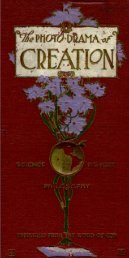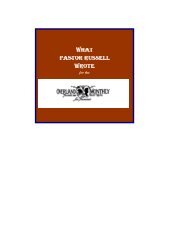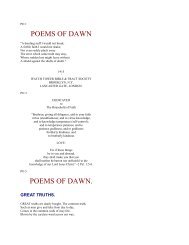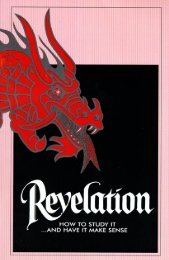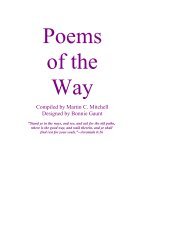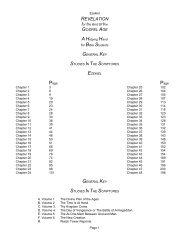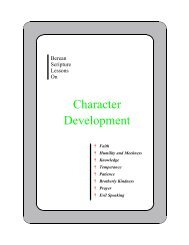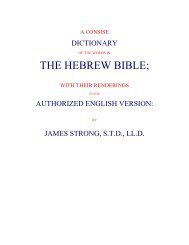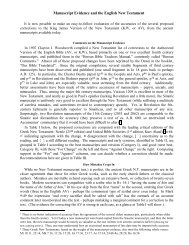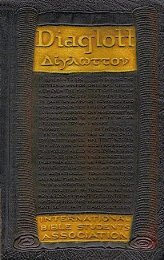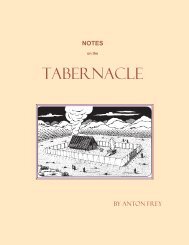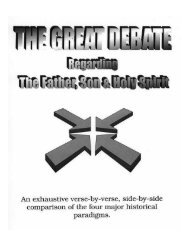- Page 1 and 2:
THE REVELATION OF JESUS CHRIST R. E
- Page 3 and 4:
prayerfully read these works will,
- Page 5 and 6:
the Divine blessing on both head an
- Page 7 and 8:
have met their fulfillment without
- Page 9 and 10:
all who in any way uphold these. .
- Page 11 and 12:
"Is it likely that there should be
- Page 13 and 14:
associated with the martyrs of Jesu
- Page 15 and 16:
would be a brief one. However, it i
- Page 17 and 18:
Chrysostom then gives a reason why
- Page 19 and 20:
outbreak of evil at its close. This
- Page 21 and 22:
death for the truth of our Lord Jes
- Page 23 and 24:
this authority "damned all Lutheran
- Page 25 and 26:
details being, as is divinely impli
- Page 27 and 28:
view of all this, how can it be que
- Page 29 and 30:
Marcella to quit Rome for Bethlehem
- Page 31 and 32:
trances and ecstasies and would app
- Page 33 and 34: Upon the Gospel's sacred page The g
- Page 35 and 36: syllables, trying in vain to make s
- Page 37 and 38: His Father." Are the kings and prie
- Page 39 and 40: eing the express image of the Fathe
- Page 41 and 42: "In that Day, ultimately all eyes s
- Page 43 and 44: those who have faithfully followed
- Page 45 and 46: Visions are not realities In additi
- Page 47 and 48: Lord, present with His Church, woul
- Page 49 and 50: sentence, may all be ultimately del
- Page 51 and 52: We will examine first the primary s
- Page 53 and 54: epresentative of the church; that i
- Page 55 and 56: ishops or pastors of the seven loca
- Page 57 and 58: Messages apply to seven distinct ep
- Page 59 and 60: to himself a hopeless search. Go wh
- Page 61 and 62: Was it love for the work, or servic
- Page 63 and 64: have not been willing fully to face
- Page 65 and 66: again in the Church's history. Even
- Page 67 and 68: paradise, we recall, is elsewhere r
- Page 69 and 70: The words of the Savior, "which was
- Page 71 and 72: were put to the most cruel tortures
- Page 73 and 74: sorrow. She then raised up the fain
- Page 75 and 76: professing church systems. It is th
- Page 77 and 78: Comfortless, afflicted, broken, Fai
- Page 79 and 80: The same temptation under which the
- Page 81 and 82: toward lordship in the Church--sepa
- Page 83: ". . . if he could not keep them in
- Page 87 and 88: the priests and the religious repre
- Page 89 and 90: hidden lives of those who, amid the
- Page 91 and 92: the parable seem to refer to the "f
- Page 93 and 94: will suffer with her in the "plague
- Page 95 and 96: of their still worse defections, by
- Page 97 and 98: This period of church history found
- Page 99 and 100: new beginning. For a brief space of
- Page 101 and 102: eligion may be revived. In the appa
- Page 103 and 104: who had not been contaminated to a
- Page 105 and 106: In the words of the Savior, "And I
- Page 107 and 108: "If ye keep My commandments, ye sha
- Page 109 and 110: of Luther and his friends. The Refo
- Page 111 and 112: "'If Christ was the universal Sheph
- Page 113 and 114: This was not only true of those in
- Page 115 and 116: warranted that the Philadelphian ca
- Page 117 and 118: ecame haughty and skeptical . . . S
- Page 119 and 120: love, in marked contrast with these
- Page 121 and 122: looked upon as merely negativing ev
- Page 123 and 124: of joint-heirship with the Redeemer
- Page 125 and 126: However, it would seem that we may
- Page 127 and 128: are apostles, and are not, and hast
- Page 129 and 130: As throughout the preceding six sta
- Page 131 and 132: 'people's right,' has become, moral
- Page 133 and 134: own origin), declares Himself to be
- Page 135 and 136:
of the many evidences of a loss or
- Page 137 and 138:
ichly endowed with all the good thi
- Page 139 and 140:
"We should expect that at the time
- Page 141 and 142:
Scriptures which plainly teach this
- Page 143 and 144:
The simple meaning in this vision i
- Page 145 and 146:
Following this, the Apostle beheld,
- Page 147 and 148:
the persecuting Antichrist, and the
- Page 149 and 150:
"The Revelation of Jesus Christ [sy
- Page 151 and 152:
"Around the throne of God are seen
- Page 153 and 154:
therefore there is no ground for th
- Page 155 and 156:
seat, but it came to be employed to
- Page 157 and 158:
for instance the giving of the seal
- Page 159 and 160:
Mr. Barnes who notes the similarity
- Page 161 and 162:
tamed animals; the eagle over the f
- Page 163 and 164:
it may be remarked, that symbols of
- Page 165 and 166:
in which He will be pleased to gran
- Page 167 and 168:
means of European Colonies has been
- Page 169 and 170:
was a day's wages for the average m
- Page 171 and 172:
"The persecutions of the Christians
- Page 173 and 174:
that the "Lord's goat," representin
- Page 175 and 176:
the moon shall not give her light,
- Page 177 and 178:
"Noah Webster, LL.D., wrote in 1843
- Page 179 and 180:
Papacy's power in this direction, w
- Page 181 and 182:
obscured, and the Law comes to be r
- Page 183 and 184:
In these two statements we have a d
- Page 185 and 186:
The angel from the sun-rising would
- Page 187 and 188:
Some Futurist expositors cite as an
- Page 189 and 190:
1. God predestinated that the numbe
- Page 191 and 192:
occupy and of their employment in t
- Page 193 and 194:
ecause it shall be revealed by fire
- Page 195 and 196:
Nevertheless, we can well understan
- Page 197 and 198:
the Gospel Age, and that they have
- Page 199 and 200:
command is very apparent: first, th
- Page 201 and 202:
The first event in connection with
- Page 203 and 204:
temple were destroyed by the Romans
- Page 205 and 206:
however, that this great hail and f
- Page 207 and 208:
Concerning this important event of
- Page 209 and 210:
This second trumpet portrays what w
- Page 211 and 212:
closely connected with the fulfillm
- Page 213 and 214:
and excessive taxation of the peopl
- Page 215 and 216:
own private judgment, and taking in
- Page 217 and 218:
"fountains and rivers," and note th
- Page 219 and 220:
In the symbol of this third trumpet
- Page 221 and 222:
The third trumpet--the falling of t
- Page 223 and 224:
center of the Gospel light has from
- Page 225 and 226:
about 1829 that a distinctive Adven
- Page 227 and 228:
they would predict calamities comin
- Page 229 and 230:
2. However, we would not say that t
- Page 231 and 232:
distorting and misapplying the prop
- Page 233 and 234:
By noting this historian's account
- Page 235 and 236:
"And it was commanded them that the
- Page 237 and 238:
existence of this Saracenic power w
- Page 239 and 240:
The Revelator tells us that when th
- Page 241 and 242:
the only one that succeeded the Sar
- Page 243 and 244:
some suffered death in the most bar
- Page 245 and 246:
defensive armor, giving boldness an
- Page 247 and 248:
As introductory to a consideration
- Page 249 and 250:
fulfillment of the vision. It would
- Page 251 and 252:
voice of the Lord is powerful . . .
- Page 253 and 254:
"And the rest of the men which were
- Page 255 and 256:
seemingly been crushed in their con
- Page 257 and 258:
executed chiefly under the auspices
- Page 259 and 260:
epresented Holy Writings or message
- Page 261 and 262:
fanatical weaver named Claus Starck
- Page 263 and 264:
oth senses in which it is used: the
- Page 265 and 266:
"Many are the inquiries relative to
- Page 267 and 268:
events, which have occurred since,
- Page 269 and 270:
5. The resultant "seven thunders" r
- Page 271 and 272:
"Not only measure the doctrines in
- Page 273 and 274:
witnessing and suffering for the tr
- Page 275 and 276:
Praise the Lord! ye heavens, adore
- Page 277 and 278:
temple, the Church, (except for a b
- Page 279 and 280:
"The witnesses, therefore, cannot b
- Page 281 and 282:
witnesses (the Old and New Testamen
- Page 283 and 284:
This last, as we shall endeavor to
- Page 285 and 286:
Harlot, and Antichrist in Rome and
- Page 287 and 288:
"There stands the fierce wild monst
- Page 289 and 290:
Range wide o'er all the pastures. A
- Page 291 and 292:
1517, that the three years and a ha
- Page 293 and 294:
ecorded this special rejoicing. One
- Page 295 and 296:
most terrible persecution ever know
- Page 297 and 298:
Protestantism were recognized by th
- Page 299 and 300:
"'Ah,' said some, 'there are plenty
- Page 301 and 302:
hastily interrupting him, exclaimed
- Page 303 and 304:
Do we in these days value the right
- Page 305 and 306:
of the Scriptures to a place of dig
- Page 307 and 308:
interference of either royalty or p
- Page 309 and 310:
"In the symbolic language of Revela
- Page 311 and 312:
of the Papacy, and embraced the tru
- Page 313 and 314:
Our God Holy and Infinite! Viewless
- Page 315 and 316:
to those who "have ears to hear." O
- Page 317 and 318:
events of this transition period. I
- Page 319 and 320:
still as a plausible fiction of dip
- Page 321 and 322:
ought before the Apostle's view, an
- Page 323 and 324:
now, while disclosing some chronolo
- Page 325 and 326:
and strengthening such as was never
- Page 327 and 328:
For ever and ever that glory shall
- Page 329 and 330:
certain other matters stated in the
- Page 331 and 332:
It was not until the ending of thes
- Page 333 and 334:
Boulogne, France, thence to Britain
- Page 335 and 336:
longer be borne, we make known by t
- Page 337 and 338:
A Roman Catholic writer, Reiner de
- Page 339 and 340:
4. That he was the one who in Eden
- Page 341 and 342:
In order to understand the symbolic
- Page 343 and 344:
presence of the nations. We may now
- Page 345 and 346:
"'Liberty being now restored, and t
- Page 347 and 348:
instrument, but a gift that formed
- Page 349 and 350:
centuries, when true believers were
- Page 351 and 352:
continuing to symbolize the Eastern
- Page 353 and 354:
"It is of course a necessary prelim
- Page 355 and 356:
of Italy, AD 1130, thus writes: 'Th
- Page 357 and 358:
Babylon being represented by a lion
- Page 359 and 360:
espect in which they were held; to
- Page 361 and 362:
And such was the claim of the bisho
- Page 363 and 364:
defend the Lord's cause by force, a
- Page 365 and 366:
"The former beast was represented a
- Page 367 and 368:
"What appears most probable is, tha
- Page 369 and 370:
Movement began to affect the Church
- Page 371 and 372:
. Language such as this aroused the
- Page 373 and 374:
Makes the earth and those who dwell
- Page 375 and 376:
he doeth great wonders, so that he
- Page 377 and 378:
The first beast, at the present tim
- Page 379 and 380:
Protestant Episcopal Church in the
- Page 381 and 382:
7. In its unbelief in, and its desp
- Page 383 and 384:
endeavor to make themselves respect
- Page 385 and 386:
"Doubtless, some of the first enact
- Page 387 and 388:
'Greetings' to the last [at the tim
- Page 389 and 390:
hundred and sixty-six.' Here only t
- Page 391 and 392:
they are His sheep they will hear;
- Page 393 and 394:
tribe of Ephraim, but chose the tri
- Page 395 and 396:
succeeding visions of this chapter,
- Page 397 and 398:
"slept" throughout the Age. These s
- Page 399 and 400:
The "voice from heaven" in this ins
- Page 401 and 402:
eing sung before the throne, etc. T
- Page 403 and 404:
instructions; they yield to His law
- Page 405 and 406:
Each moment listening for His voice
- Page 407 and 408:
Many expositors, among them those w
- Page 409 and 410:
This symbolic angel-movement is a p
- Page 411 and 412:
"dark night" sets in, when all such
- Page 413 and 414:
This same writer, further enlarging
- Page 415 and 416:
has gone forth, it must be 'cut off
- Page 417 and 418:
spiritual uncleanness; that is, hea
- Page 419 and 420:
Speaking of the Christian's attitud
- Page 421 and 422:
well as ecclesiastical authority ov
- Page 423 and 424:
faith of Jesus,' yet many such time
- Page 425 and 426:
"Now, we are full of interest to kn
- Page 427 and 428:
Chapter 34: Rev. 14:14-19 Reaping t
- Page 429 and 430:
Commenting on the words, "For the h
- Page 431 and 432:
the spirit of Christ, the Chief Rea
- Page 433 and 434:
nations. It is now very apparent, h
- Page 435 and 436:
It is doubtless those unfoldings of
- Page 437 and 438:
2. It was the priest's duty to keep
- Page 439 and 440:
This cry of the angel who was seen
- Page 441 and 442:
Christendom. The Prophet represents
- Page 443 and 444:
3. The "Holy City, the New Jerusale
- Page 445 and 446:
"After describing that the coming o
- Page 447 and 448:
We submit an interpretation which w
- Page 449 and 450:
likewise, following Him. . . . Nor
- Page 451 and 452:
Divine Plan, enables them to be del
- Page 453 and 454:
degree, be a retributive requiremen
- Page 455 and 456:
heretofore explained, we understand
- Page 457 and 458:
"Yes, dear brethren and sisters, we
- Page 459 and 460:
vision under consideration: "And af
- Page 461 and 462:
"Take the wine cup of this fury at
- Page 463 and 464:
A reasonable explanation of the wor
- Page 465 and 466:
"These evils, called plagues or bow
- Page 467 and 468:
vial is poured out. It is, however,
- Page 469 and 470:
of these two elements is due, the r
- Page 471 and 472:
forty years will be found to be mos
- Page 473 and 474:
which would have resulted in the di
- Page 475 and 476:
"Here the misery of some is caused
- Page 477 and 478:
the French Revolution, as also the
- Page 479 and 480:
It is our thought that the symbolic
- Page 481 and 482:
"Pius IX, in his Encyclical Letter
- Page 483 and 484:
way these proposed reforms were rec
- Page 485 and 486:
"What then so signal a removal of o
- Page 487 and 488:
land; either their removal or their
- Page 489 and 490:
intention to secede from the Church
- Page 491 and 492:
also be illustrated by the vision o
- Page 493 and 494:
to be serene--until the great socia
- Page 495 and 496:
Another reference by this writer to
- Page 497 and 498:
The symbols mentioned next in conne
- Page 499 and 500:
governments. St. John noted also th
- Page 501 and 502:
the time of trouble would be incomp
- Page 503 and 504:
"And there came one of the seven an
- Page 505 and 506:
To those familiar with Church histo
- Page 507 and 508:
this, and does so still, even in he
- Page 509 and 510:
On her forehead a name written "And
- Page 511 and 512:
Mary's reign; the extinction by fir
- Page 513 and 514:
time from St. John's day, namely a
- Page 515 and 516:
(Zech. 8:10); the natural outcome o
- Page 517 and 518:
In this Scripture we are considerin
- Page 519 and 520:
Papal Empire, with its ten kingdoms
- Page 521 and 522:
Thy scattered sons are gathering ho
- Page 523 and 524:
and dignitaries of the Church, who
- Page 525 and 526:
Philip Melancthon, a man of wonderf
- Page 527 and 528:
"He sells merits, the forgiveness o
- Page 529 and 530:
multitude in place of the rulers, a
- Page 531 and 532:
movement than has yet taken place,
- Page 533 and 534:
In order to understand this feature
- Page 535 and 536:
seems to have comprehended, previou
- Page 537 and 538:
this way are properly called the "b
- Page 539 and 540:
Another of his comments reveals his
- Page 541 and 542:
great,' and from all the holy unive
- Page 543 and 544:
This word "Write," seems to make it
- Page 545 and 546:
with the fulfillment of the vision
- Page 547 and 548:
"Notice, that the comparison [made
- Page 549 and 550:
We inquire, If this feature of the
- Page 551 and 552:
"To judge rightly He must see throu
- Page 553 and 554:
the precise statement of the Apostl
- Page 555 and 556:
opening of its seals; the sounding
- Page 557 and 558:
according to His Word: it is that l
- Page 559 and 560:
gathered them together into a place
- Page 561 and 562:
applies the words, "It has been don
- Page 563 and 564:
teaching characteristic. Papacy, al
- Page 565 and 566:
necessity on account of the revolut
- Page 567 and 568:
socialists, who mistakenly see in t
- Page 569 and 570:
persecuting them unto death, and de
- Page 571 and 572:
Nor is the reason for this collapse
- Page 573 and 574:
Therefore, it will be seen that the
- Page 575 and 576:
"Many may be the instruments [angel
- Page 577 and 578:
more especially to the particular t
- Page 579 and 580:
earth in the Millennium. They will
- Page 581 and 582:
"1. Satan bound for a thousand year
- Page 583 and 584:
2. Daniel "beheld . . . the judgmen
- Page 585 and 586:
These Millennial times, as already
- Page 587 and 588:
nations of the earth. Too many in t
- Page 589 and 590:
which are interwoven in the Mosaic
- Page 591 and 592:
the veil to be forever with the Lor
- Page 593 and 594:
is established. The words indicated
- Page 595 and 596:
calls them kings and priests. In ot
- Page 597 and 598:
that feature of the Divine Plan tha
- Page 599 and 600:
Concerning what is represented in t
- Page 601 and 602:
"The great Mediator will indeed 'de
- Page 603 and 604:
cannot refer to these human beings
- Page 605 and 606:
of Christ and His saints over the w
- Page 607 and 608:
added to fire in the symbol, it int
- Page 609 and 610:
In Isa. 24:17-20 we read of this sa
- Page 611 and 612:
the Man Christ Jesus, the expositio
- Page 613 and 614:
an interpretation of St. John's vis
- Page 615 and 616:
fail; in short when God's mercy and
- Page 617 and 618:
All nature's voices loud proclaim T
- Page 619 and 620:
together. As to how these glorified
- Page 621 and 622:
and as a result we see the prelimin
- Page 623 and 624:
"And God shall wipe away all tears
- Page 625 and 626:
Exults to see its thistly curse rep
- Page 627 and 628:
forever the associate and represent
- Page 629 and 630:
Chapter 49: Rev. 21:9-22:5 The New
- Page 631 and 632:
eloquence, no form of human speech
- Page 633 and 634:
fact that the angel who called to J
- Page 635 and 636:
Mr. Lord's interpretation of some o
- Page 637 and 638:
The holy city the place of mediatio
- Page 639 and 640:
interest, the joy of the waking tho
- Page 641 and 642:
"The waters are in both cases from
- Page 643 and 644:
"As soon as the Marriage of the Lam
- Page 645 and 646:
The time occupied by the revealing
- Page 647 and 648:
much these exhortations were needed
- Page 649 and 650:
Mr. Barnes' thought concerning this
- Page 651 and 652:
understood do not teach anything of
- Page 653 and 654:
was raised up, even David's Lord; a
- Page 655 and 656:
"For I testify unto every man that
- Page 657 and 658:
watchfire she took her stand each n
- Page 659 and 660:
people in different periods of the
- Page 661 and 662:
9. The French Revolution of 1793-17
- Page 663 and 664:
17:10. We have witnessed its tempor
- Page 665 and 666:
other with a glad 'here we are at l
- Page 667 and 668:
The opportunities for laying up tre
- Page 669 and 670:
Hippolytus.--Christ and Antichrist,
- Page 671 and 672:
Josephus, Flavius. Lactantius. Laya
- Page 673:
PASTORAL BIBLE INSTITUTE 1425 Lachm



